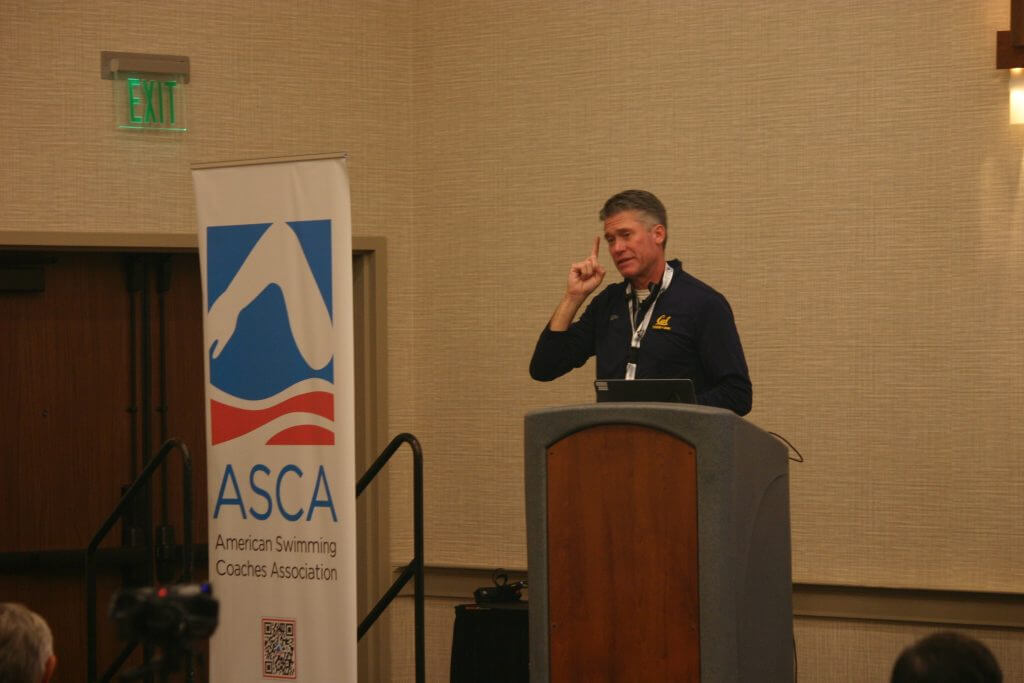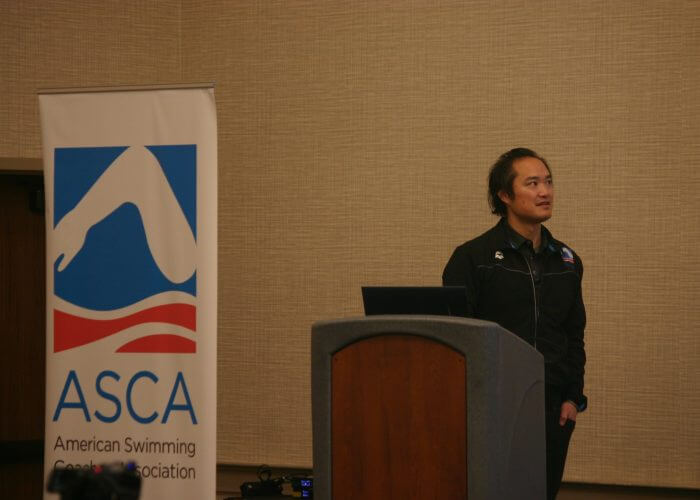ASCA Pacific Coaches Clinic Features Wisdom, Tips From Legendary Coaches (Watch Videos)

ASCA Pacific Coaches Clinic Brings West Coast Coaching to Forefront
2025 kicked off to a fantastic start for the American Swim Coaches Association, as some titans of the coaching world touched down in Napa, California recently for a weekend filled with knowledge. Day one saw Russell Mark take coaches through the Level Two Stroke School, a six hour presentation breaking down each stroke to its very base layers, complete with visual examples of Olympic athletes. Bill Meier took things over in the afternoon, showcasing his Swim America lessons program and taking an in depth look at what makes up a successful swim lesson program in the long term.
The second day of the conference brought out some heavy hitters who supplied some truly engaging talks. Russell Mark continued his excellent stroke talks, as Fort Collins Area Swim team coach Mackenzie Novell took the stand for a talk on age group swimming. Eddie Reese followed her age group talks with discussions that tapped into his Hall of Fame career knowledge. More, Olympic legend Natalie Coughlin made her way to Napa with Gaderian Wines.
Russell Mark
ASCA’s resident astrophysicist Russell Mark is a special component of World Swimming. Mark has been working alongside some of Team USA’s greatest athletes for the better part of the last two decades. Beyond that, he’s been a valuable asset for World Aquatics in helping more disadvantaged countries’ athletes find their own way into the water.

Russell Mark at the 2025 ASCA Pacific Coaches Clinic
After an engaging six-hour session breaking down every stroke on Friday, Mark came in swinging with a more in depth look at backstroke. A key method of engagement he used was to showcase different drills through video, followed by using real world examples from an Olympic race or professional swimmer to execute his point.
Mackenzie Novell
After an excellent talk at the ASCA World clinic in September last year, Mackenzie Novell took the podium again in Napa. A fantastic age group coach, Novell exuded her passion for the sport. Key aspects of Novell’s ideas came from making sure age group swimmers felt valued. Helping a young swimmer find their love for the sport or discovering unique ways to motivate them can have a lasting impact on their lives.
Complete with videos showcasing her athletes happy and excited, Novell explained the complex relationship that parents and coaches can often have. With their swimmers being their top priority, there can be push back between coaches and guardians on how best to help the child succeed. Novell touched on these ideas while explaining how to navigate that path successfully.
Eddie Reese
Texas Longhorn legend Eddie Reese was in the building Saturday afternoon for two excellent talks. In contrast to the now more common strategy of swimming fast year-round, Reese spoke about his differing ways of coaching. November to January are months he mentioned where he works his swimmers particularly the hardest. John Shebat was an example Reese mentioned (although not by name). In 2019, Shebat went 1:47 in the 200-yard backstroke against N.C. State in January. Just weeks later, he blasted to a 1:36 to win the NCAA title over Austin Katz by just three hundredths of a second.
For Reese, the concept of taper seemed exceedingly important. Building up swimmers to be tired but working hard, followed by a successful decline to nail their taper is what makes up much of his coaching success. In his own words, Texas’ dual meet record is likely not very good. Their record at championship meets, however, speaks for itself.
Furthermore, Reese mentioned the importance of taking accountability as a coach. For him, if his swimmer didn’t succeed, he would take responsibility for having done enough to set them up for success.
Dave Durden & Stroke Progression/Teaching
Cal Bears head coach Dave Durden took time in his hour-long talk on Saturday to discuss the specifics of each stroke and its respective drills. Beyond his excellent breakdowns of each stroke, Durden also explained the importance of how each practice is broken down. Kicking is one of the most important aspects of one’s swimming fundamentals, and it’s something he strives to have take up 20% of the week’s practice.
When trying to make sure these teachings stay with his swimmers, Durden spoke about the importance of videos. For example, by watching high level athletes and videos of their own swimming, athletes can better visualize what it takes to nail down a particular drill or technique change they are working toward. In addition, peer critique is massively important. It’s no understatement to say that NCAA swimming is filled with a beautiful team culture that brings about positive atmospheres and unity. Taking advantage of that facet of the sport can help strengthen team bonds through peer critique.
Greg Meehan & The Journey to Pro Swimming
Meehan highlighted the progression of club swimmer to college swimmer to pro swimmer. He highlighted many of the athletes on his Stanford women’s team, including recent Olympic champion Torri Huske. Meehan showcased some of the ways he helps his athletes navigate that world, while never missing the opportunity to discuss how Team USA can improve and become a stronger force.
A particularly strong point Meehan brought up is the success of the Stanford Women’s team over the last 365 days. After winning the NCAA Championship team title in 2018, many perceived a decline in Meehan’s coaching following the departure of swimming titans Katie Ledecky, Regan Smith, and Claire Curzan. That wrongful narrative fell apart over the leadup to the Paris Olympics, culminating in an individual Olympic gold for Torri Huske. Beyond Huske’s achievement, the Cardinals showed up in a big way at NCAAs and Olympic Trials. Aurora Roghair, Lucy Bell, Lillie Nordmann, Amy Tang, & Caroline Bricker are just some of the names that went massive lifetime bests and made finals at 2024 championship meets.
Meehan used these names to highlight a broader point. Much of the reason Stanford has had recent success sits in its legacy. By utilizing the rich alumni history present in the Cardinal ranks, past athletes can advise current ones about the pressure and emotions that come with big meets.



